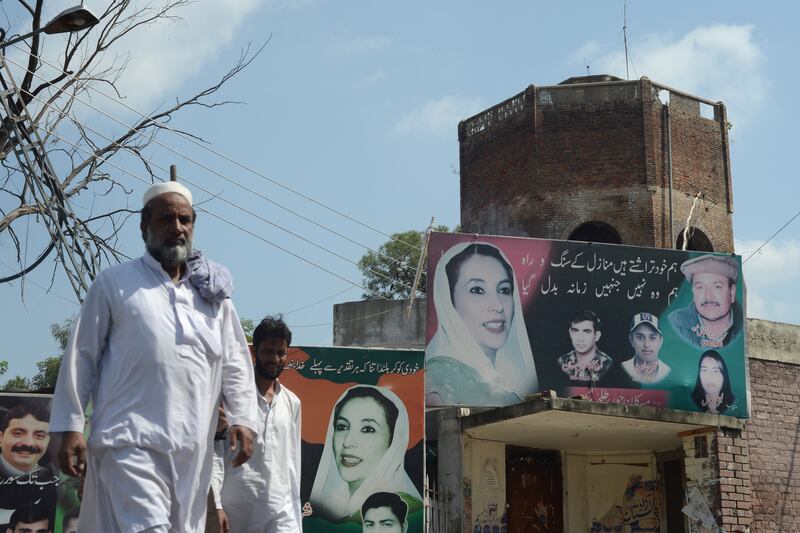The indictment of Pakistan’s former military ruler, Gen. Pervez Musharraf, in connection with the 2007 assassination of Prime Minister Benazir Bhutto is the latest twist in the country’s complex saga of political intrigue.

Although military dictators have ruled Pakistan for more than half its history, Musharraf is the first senior general to face criminal charges. In the past, Pakistan’s army has blocked trials of its retired leaders even after military defeat or surrender and reports of atrocities against the country’s civilians. The army’s grip on power has not eroded, though an assertive judiciary and a hyperactive media make it difficult to shove things under the carpet.
Putting Musharraf on trial, without exposing others who might have had a role in Bhutto’s assassination, might be the second-best thing from the point of view of generals who still believe that they alone know what is best for Pakistan. But unless it results in full disclosure of facts relating to Bhutto’s murder, and the cover-up that followed, the case against Musharraf will only further divide an already polarized nation.
Bhutto was twice elected prime minister only to be removed from office, ostensibly on corruption charges, by presidents backed by the military. In both her terms, jihadi groups, including al Qaeda, considered Bhutto a danger to their plans of using Afghanistan and Pakistan as centers for their global jihad. In 1989, Osama bin Laden funded an effort to oust her from power by buying off legislators during a parliamentary vote of no confidence. Ramzi Youssef, who was involved in 1993 al Qaeda attack on New York’s World Trade Center, later admitted planning Bhutto’s murder soon after the New York bombing.
From the jihadists’ point of view, Bhutto was a Western-educated woman who represented a vision for Pakistan and the Muslim world diametrically opposed to their own. For them, a Muslim woman leader elected by popular vote symbolized the kind of modernity they hoped to block through jihad. For them, being a woman with a Western education was enough reason to hate Bhutto with a passion.
Pakistan’s generals resented Bhutto for their own reasons. Despite adverse propaganda and ouster from power amid corruption charges, Bhutto remained widely popular among Pakistanis. The army’s senior commanders saw Bhutto as a challenge to their authority ever since Islamist dictator Gen. Zia-ul-Haq hanged Bhutto’s father in 1979 on what are widely believed to be trumped-up charges of plotting to assassinate a political opponent. Bhutto’s spouse, Asif Ali Zardari, was imprisoned for 11 years without conviction for any crime. But even that did not eliminate Bhutto’s support base.
Bhutto’s resilience forced Musharraf to let her return from exile in 2007. On her return, she attracted huge crowds, and a suicide bomber attacked her very first rally in Karachi, killing scores of Bhutto supporters. After this, Musharraf’s administration should have enhanced security for the former prime minister but did not. Instead, Musharraf tried to use security arrangements as a bargaining chip so that he might force Bhutto into a political compromise.
Benazir Bhutto was assassinated after a political rally on December 27, 2007, in Rawalpindi, the garrison town adjoining Pakistan’s capital, Islamabad. Before her death, she had written to a number of friends that Musharraf should be held accountable if she was killed because of lax security and the possible complicity of some people within his administration who sympathized with the jihadists.
The Bhutto assassination has been investigated by a special United Nations Commission, but Musharraf is the only senior official charged specifically with a role in that murder. The U.N. investigators discovered that an army officer had ordered the hosing down of the crime scene and the police had “deliberately botched the investigation.” Musharraf alone cannot be charged with the conspiracy unless others involved in that conspiracy are also named and indicted. The more important question relating to the links of al Qaeda and its Pakistani affiliates and their role in the assassination also needs to be further explored.
Pakistan’s chief justice, Iftikhar Chaudhry, appears to carry a grudge against Musharraf, who removed him from his position in 2007 only to be restored two years later by the civilian government that followed Musharraf. Chaudhry is not known to always root his judgment in law and could use the Bhutto assassination case to settle his score with Musharraf—the man who both gave him his job and took it away.
But Musharraf’s trial would help Pakistan confront the demons of its convoluted past only if it is free of the taint of political vendetta. Musharraf must certainly be held accountable, but so should everyone else involved in killing the anti-jihadi, pro-Western leader Pakistan could have had.
Americans often worry about nuclear-armed Pakistan as the most dangerous country in the world. Solving the murder of a popular civilian leader who could have taken Pakistan way from its jihadist path could be a starting point for at least understanding the combination of forces that make Pakistan so dangerous.






